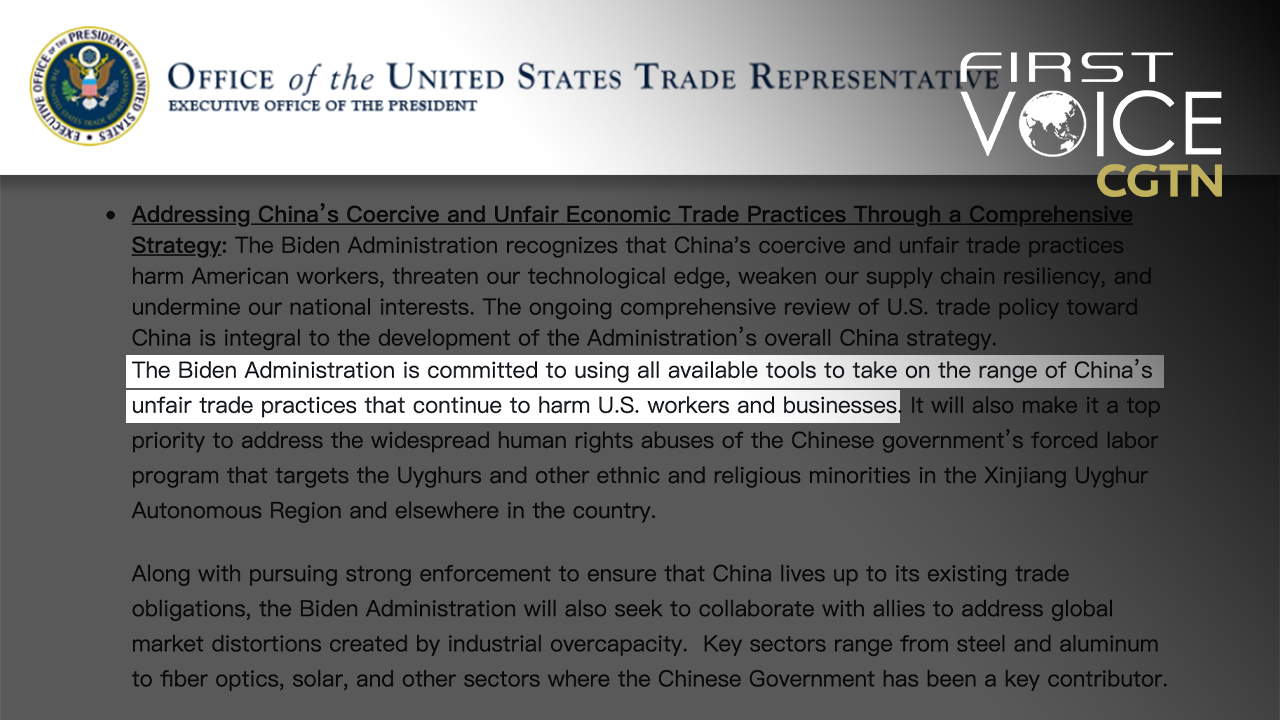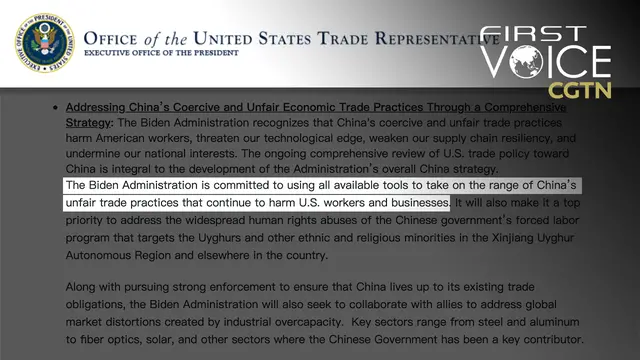
Editor's note : CGTN's First Voice provides instant commentary on breaking stories. The daily column clarifies emerging issues and better defines the news agenda, offering a Chinese perspective on the latest global events.
The Biden administration has discovered that hard-line rhetoric against China is a difficult drug to quit.
A recent report from the Office of the U.S. Trade Representative promises, "The Biden administration is committed to using all available tools to take on the range of China's unfair trade practices that continue to harm U.S. workers and businesses."
It is easy to blame China for diminishing employment prospects. It's hard to tell unskilled American workers that the well-paid blue-collar jobs their parents and grandparents enjoyed have vanished forever – along with fax machines and cassette players.
It is even harder to explain how the incredible wealth created by globalism ended up in the pockets of the richest Americans – while everyone else struggles to pay for education, health care, housing and other basics.
U.S. politicians keep dangling the dream of a return of blue-collar jobs in front of voters.
Both the Trump and Biden administrations have avoided an ugly truth. Even if the U.S. establishes itself as a world-class manufacturing center like Japan, most of the work will be automated, and jobs will go to highly skilled workers.
Even highly competitive manufacturing economies like Japan outsource much of their production to low-cost labor centers like Vietnam and Bangladesh.
China, which is turning to automation as labor costs increase, is starting to do the same.
U.S. politicians are addicted to pushing another fantasy – that America is a beacon of good with a superior system that will inevitably triumph.
According to this storyline, the U.S. is facing the dark night of the soul. All seems to be lost. But just like in a Hollywood blockbuster, the U.S. will unexpectedly come from behind and triumph over "evil" China, because of American values.
The Office of the U.S. Trade Representative report says China's trade practices "threaten our technological edge."
The truth is, China is no more good or evil than the U.S., and is not a threat to Americans.

Capitol Carbonic dry ice factory in Baltimore, Maryland, U.S., November 20, 2020. /CFP
No matter what policies the U.S. adopts, it cannot stop China's rise. Technology bans or decoupling the two economies may slow China's development by a few years, but they will handicap U.S. growth even more, isolating it from lucrative global trade opportunities.
The U.S. seems to be in denial of the fact that China will inevitably have an economy many times larger than the U.S. within decades.
China's people are just as hardworking and innovative as anyone else in the world, and the Chinese system is as well or better prepared to support their aspirations for prosperity.
It is inevitable that China will match and in some areas surpass the U.S. in technology, just as South Korea, Japan and Germany have before, and other countries will in the future.
This does not need to be a source of concern.
The U.S. talks a tough game when it comes to China, misdirecting voters from blaming a system in which the rich keep getting richer while most people feel increasing financial pressure.
The China-U.S. partnership has generated incredible wealth for both sides, even as Beijing continues to be a useful public scapegoat for the Biden administration.
It is a failing of U.S. policy that this wealth has not been shared with working people.
The real way to help Americans is to drop the good guys versus bad guys act. Domestically, the U.S. should figure out a way to help unskilled workers left behind by permanent changes in the times.
Internationally, the U.S. needs to engage in constructive negotiations with the rest of the world to establish norms for global trade and institutions.
U.S. leverage to "take on China" is vanishingly small. The Biden administration's tough talk is so far all hat and no cattle.
(If you want to contribute and have specific expertise, please contact us at [email protected].)
 简体中文
简体中文

